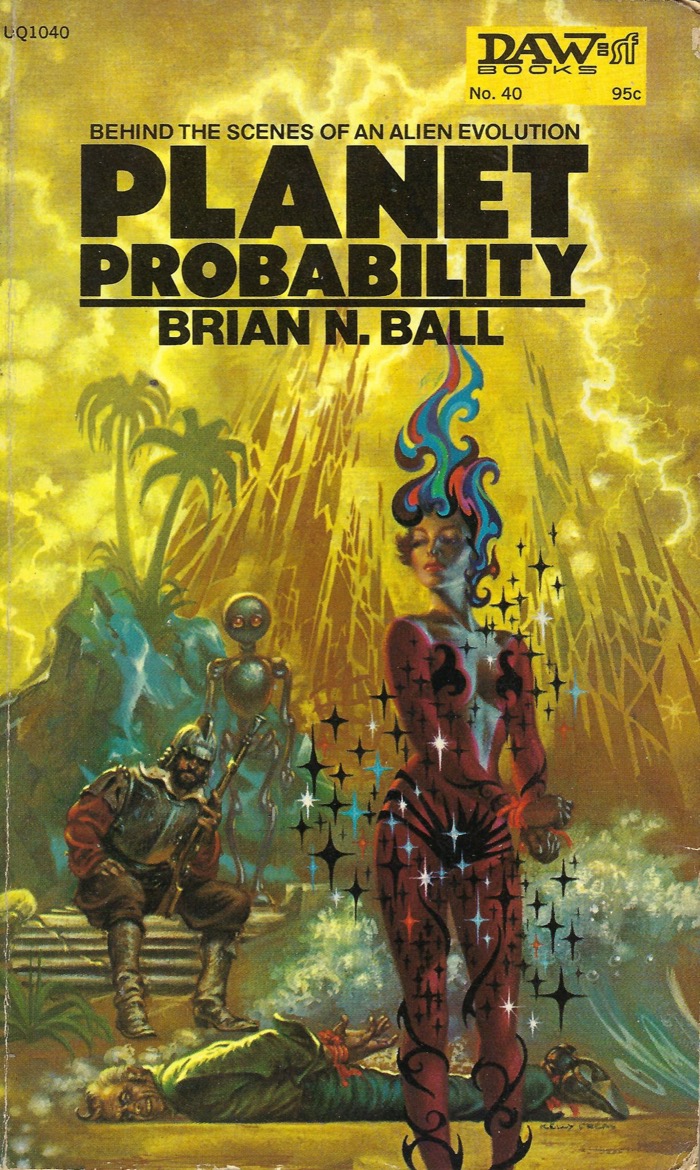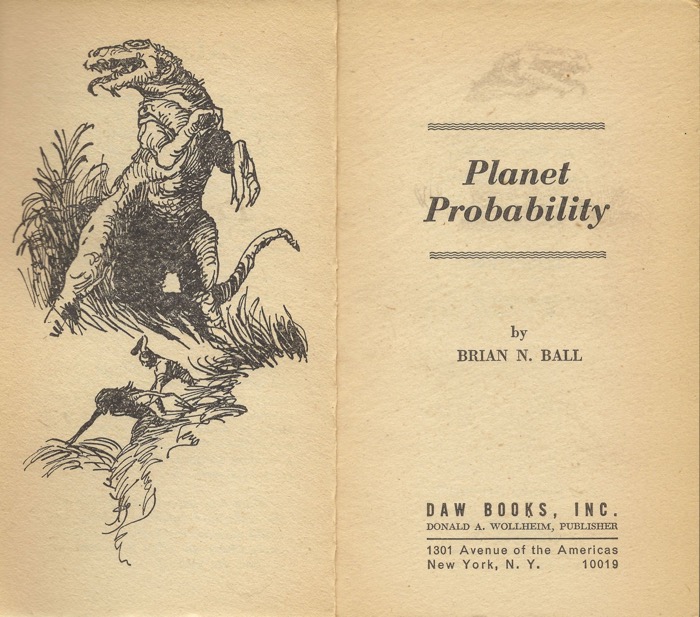Planet Probability
Series: Probability Man 2
Reviewed date: 2020 May 26
Rating: 2
188 pages
Once again I find I'm reading a sequel to a book I've never read. Oops. This one has a lot of back-story that I think I managed to pick up along the way.
Setting: Frames and Plots
In the Thirtieth Century, mankind has developed the ultimate form of entertainment: Frames. The Frames are artificial constructed environments that correspond to real or imagined periods in history. Plot Directors fill these Frames with people and set events in motion, and the result is pure, perfect, total entertainment. The effect is made complete by memory and personality transplants into the participants, so not only are they physically present, they are mentally and psychologically a part of the world within the Frame. People live through the most exciting and exhilarating events in history--like trench warfare of World War I--jazzed up with the Plot Director's personal touches. It's amazing and wonderful and hedonistic and horrific and degrading and grisly, but nobody seems to object, so there you go. Decadent.
Backstory: Talisker and Spingarn
From what I can deduce, in the previous book a man named Spingarn traveled to the planet Talisker to do...something. Talisker is the planet where Frames were first tested and developed, but the planet has been uninhabited for ages. On Talisker, Spingarn met an Alien and got something called the Genekey, which...I don't know, but it was important for Spingarn's quest. In any event, (I think) Spingarn partially succeeded in his quest (again, I'm not sure what precisely he intended to do), but neither he nor his assistant Hawk returned from Talisker. His robot, Horace, returned with his memories wiped.
Marvell and Liz
Marvell is a Plot Director--he creates stories in the Frames. He is middle-aged, fat, and misogynistic. (He says bitch a lot.) He talks to himself out loud, and he's a coward. Marvell is a whining, whimpering, unsympathetic character.
Liz Hasell is his assistant. She is young, pretty, and accepts whatever abuse comes her way, in a way that makes me think she doesn't notice or care. Liz is boring--she does what's she's told, and she's not appreciably tougher or smarter than Marvell. Well, maybe a little smarter, but mostly because Marvell is too craven to notice facts staring him in the face.
Marvell is just starting off a new Plot he's devised when Deneb, the Director of Disaster Control, hauls Marvell and Liz to see him: there's a problem. Random probabilities in the Frames are causing Plot disasters all across known space, and the central computers at Disaster Control can scarcely keep things under control. The problem originates on Talisker. Therefore, Deneb has a special mission for Marvell and Liz: go to Talisker, find Spingarn and the Alien, and fix things.
[Deneb said:] "Spingarn faced the Alien and brought back the Genekey. When you contact the Alien, do as much as he did. That's your assignment. Contact the Alien entity and find some way of ironing out the random probabilities in the Frames."
Horace
Deneb sends Spingarn's robot Horace along with Marvell and Liz.
Does this make sense?
No, it does not. None of this makes any sense. Just go with it.
Sergeant Hawk
On Talisker, the crew run into Sergeant Hawk, Spingarn's former companion. Due to the overlaid Plot personality taking over his entire brain, Hawk thinks he's a Gunpowder Age soldier in the service of Queen Anne. He talks funny and yells insults like "cozening lying whoreson poxy Frogs" and thinks everything is a French plot. He tells Liz "cover your bubbies" so I guess he's prudish too. In any case, he's the funniest and most memorable character in the book. Spingarn is nowhere to be found.
The Alien, the Gates of Hell, and the Alien Possibility Space
Spingarn is nowhere to be found, but there's the Alien, or an Alien artifact, or possibly an Alien experiment. Sergeant Hawk calls it the Gates of Hell, and says Spingarn is inside. So the group enters. They are immediately attacked by a Tyrannosaurus Rex, which Hawk kills with a well-thrown grenade. Horace says they are in the Alien's Possibility Space. Whatever that means.
Dinosaurs, Crocodiles, Tigers, and Anthropoids
The Alien's Possibility Space is like a Frame, except the Alien has the power to transmute humans into other forms. It's used the Frames on Talisker to create habitats, and has transmuted people into creatures from various epochs in Earth's history: dinosaurs, ancient crocodiles, prehistoric tigers, anthropoid apes. The group finds Spingarn--and his woman and their twin children: they are tigers. The Alien turns Liz and Marvell into anthropoid apes, and they run off and have ape sex and ape adventures for several days or weeks. It's horrifying. While that's going on, Horace rescues the others; once outside of the Possibility Space, Spingarn and his family transmute back into humans.
Spingarn and Marvell confront the Alien
None of this makes any sense. But just roll with it, because it gets weirder. Spingarn re-enters the Possibility Space to rescue Marvell and Liz. Poor dumb Sergeant Hawk bombs the Possibility Space with a barrel of gunpowder. Everything--Alien, Spingarn, Marvell, and Liz--turns into a swirl of disembodied energy and howling thoughts.
It's Marvell--lately of being-an-anthropoid-ape fame--who figures everything out. The Alien comes from a different Universe, and wants to get back home. But it has lost its knowledge about itself and its own origin, so it can't return. Therefore, in an attempt to learn and understand life in this universe, the Alien set up the Frames to study life from Earth. Because it doesn't have perfect information about Earth's history, the Alien has supplemented its experiments with guesses and extrapolations. Hence, a Possibility Space.
Marvell tells the Alien to experiment on itself. Just as it set up the Frames to explore the evolutionary ladder of Earth, the Alien should explore the possibilities and probabilities of its own evolution. When it understands itself, it can find a way home to its own universe.
The Alien does as Marvell suggests. It experiments. It learns. It leaves Talisker and returns to its own universe. All the people in the Frames--the Possibility Space--transmute back into people. The end.
Oof.
Are we done now? We're done. This book makes no sense. The characters are bizarre--Marvell is craven, Liz is ill-used by the author. Spingarn comes into the story about halfway through and clumsily replaces Marvell and Liz as the main character. Horace the robot is a magic authorial plot device--he is constrained by his programming from interfering except when the author needs him to get the others out of a tight spot, and his memory is wiped except when the author needs him to remember something to supply a timely infodump. The only fun character is Sergeant Hawk, and that's only because he's a big joke.
I'm sorry, but this one isn't a winner. It's got its moments, but overall the plot is a mess, the storytelling is disjointed, and the characters are not well used.

